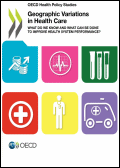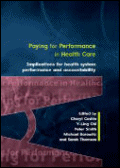 SELECTED FOR YOU... OCTOBER 2014
SELECTED FOR YOU... OCTOBER 2014
 books of the month
books of the month
 watch on health economics
watch on health economics
All the Selected for you
BOOKS
Geographic Variations in Health Care: What Do We Know and What Can Be Done to Improve Health System Performance?
Organisation de Coopération et de Développement Economiques. (O.C.D.E.). Paris. FRA
Paris : OCDE, 2014
Geographic variations in health care use across and within countries have been widely documented, for a limited number of countries including the United States, Canada, the United Kingdom and Nordic countries. While some of these variations reflect differences in patient needs and/or preferences, others do not. Instead, they are due to variations in medical practice styles, the ability of providers to generate demand beyond what is clinically necessary, or to unequal access to health care services. These unwarranted variations raise concerns about the equity and the efficiency of health systems. This report presents new information on geographic variations in health care utilisation within and across 13 OECD countries: Australia, Belgium, Canada, the Czech Republic, Finland, France, Germany, Israel, Italy, Portugal, Spain, Switzerland and the United Kingdom (England). The analysis focusses on a selected set of high-volume and high-cost health care activities. Data are reported for the most recent year (often 2011) and sometimes for several years, allowing some analysis of trends. Health care utilisation is recorded at the patient's place of residence. Hence, the level of use in a given area cannot be explained by patients receiving treatment in other geographic areas. Utilisation rates have been standardised by age and sex to remove the effect of differences in population structures. The report considers possible causes of these variations and explores health policies expected to reduce unwarranted variations. (résumé de l'éditeur).
Paying for Performance in Health Care : implications for health system performance and accountability.
Cashin C. / éd., Chi Y.L. / éd., Smith P. / éd., Borowitz M. / éd., Thomson S. / éd.
Maidenhead : Open University Press, 2014
Health spending continues to outstrip the economic growth of most member countries of the Organisation for Economic Co-operation and Development (OECD). Pay for performance (P4P) has been identified as an innovative tool to improve the efficiency of health systems but evidence that it increases value for money, boosts quality or improves health outcomes is limited. Using a set of case studies from 12 OECD countries (including Estonia, France, Germany, Turkey and the United Kingdom), this book explores whether the potential power of P4P has been over-sold, or whether the disappointing results to date are more likely to be rooted in problems of design and implementation or inadequate monitoring and evaluation. Each case study analyses the design and implementation of decisions, including the role of stakeholders; critically assesses objectives versus results; and examines the “net” impacts, including positive spillover effects and unintended consequences. With experiences from both high and middle-income countries, in primary and acute care settings, and both national and pilot programmes, these studies provide health finance policy-makers in diverse settings with a nuanced assessment of P4P programmes and their potential impact on the performance of health systems (4e de couverture).

The Elgar companion to health economics.
Jones A.M.
Cheltenham : Edward Elgar Publishing, 2012
The aim of The Elgar Companion to Health Economics is to take an audience of advanced undergraduates, postgraduates and researchers to the frontier of research in health economics, by providing them with short and easily readable introductions to key topics. The second edition brings together 54 chapters written by more than 90 leading international contributors. The contributions to the Companion are concise and focus on specific concepts, methods and key evidence. The Companion is a comprehensive and authoritative original reference volume covering theoretical and empirical issues in health economics with a balanced range of material on equity and efficiency in health care systems, health technology assessment and issues of concern for low and middle income countries. It is organised into two broad sections. The first deals with the economics of population health and of health care systems, analysed with both equity and efficiency goals in mind. The second covers the conceptual and practical issues that arise in the evaluation of health care technologies: most often applied to pharmaceuticals but also relevant for other interventions. Many of the contributions address topical and policy-relevant issues including: the economic causes of the growth of obesity in the West, the link between illicit drug use and crime, the consequences of leaving people uninsured against the costs of health care, the impact of globalisation on the international trade in health care services, the role of informal payments in many health care systems, what equal treatment for equal needs means in practice, whether direct-to-consumer advertising of pharmaceuticals is desirable, and how economic evidence is influencing the way that new technologies are made available to patients. Other chapters stress the research done by health economists to develop theoretical models and empirical methods that illuminate the workings of health care systems (Résumé de l'éditeur).

Advances in Health Care Organization Theory.
Farnsworth S.S. éd./, Shay P.D. éd./
San Franscisco : Wiley - Jossey-Bass
Advances in Health Care Organization Theory, 2nd Edition, introduces students in health administration to the fields of organization theory and organizational behavior and their application to the management of health care organizations. The book explores the major health care developments over the past decade and demonstrates the contribution of organization theory to a deeper understanding of the changes in the delivery system, including the historic passage of the Patient Protection and Affordable Care Act of 2010. Taking both a micro and macro view, editors Stephen S. Mick and Patrick D. Shay, collaborate with a roster of contributing experts to compile a comprehensive volume that covers the latest in organization theory. Topics include : Institutional and neoinstitutional theory ; Patient-centered practices and organizational culture change ; Design and implementation of patient-centered care management teams ; Hospital-based clusters as new organizational structures ; Application of social network theory to health care.


